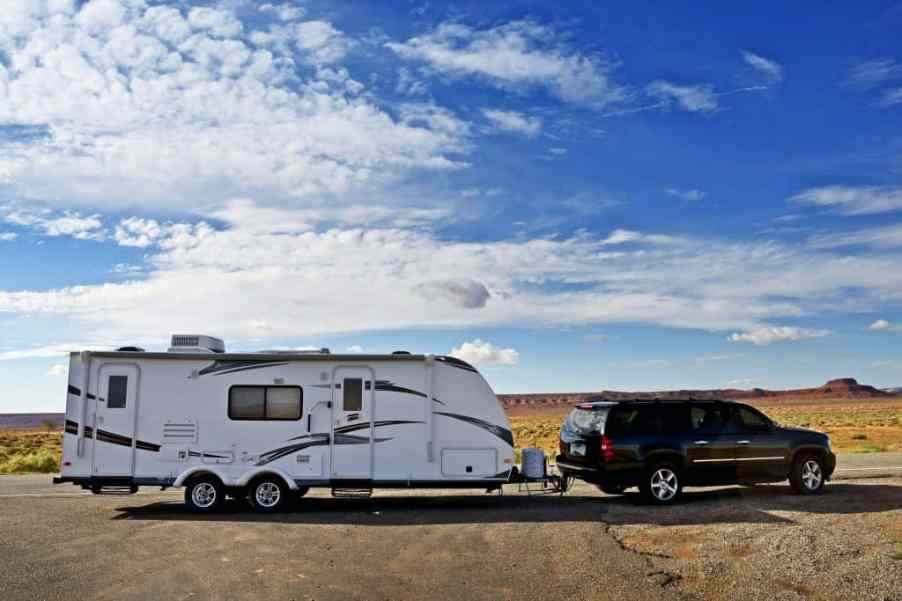
The Most Complained About Parts of Towing an RV
When it comes to RV models, a trailer makes a lot of sense for many families. Not every trailer requires you to own a big towing rig. In fact, some are light enough to be towed by a Prius. But towing an RV trailer isn’t always smooth sailing. These are the most complained about parts of towing an RV.

Is towing your RV worth it?
Totally. In spite of complaints and problems, it’s a great way to keep your adventure vehicle ready to hitch up and go when you feel like it. Towing a trailer for camping, boating, and hauling horses is typically worth it.
An RV trailer can also be significantly less expensive than a big motorhome rig or even a camper van. But it’s nice to be prepared. So let’s check out some of the problems and complaints that may arise.
Hitching your trailer
Whether you are using a Ford Expedition for a bumper pull or Chevrolet Silverado 2500 for a fifth wheel, hitching isn’t always the simplest of tasks. I remember the first time I backed my dad’s Ford F-350 in an attempt to line it up with the gooseneck hitching point. To say I was immediately in awe of how he magically got it in the correct spot on his first try nearly every time is a vast understatement.
Sure, new trucks and modern trailering packages can offer really nifty hitching cameras and other extras that can make this daunting task simpler. However, it’s still something everyone towing a trailer needs to learn how to do properly. It’s definitely one of those tasks folks who trailer often joke about.
There’s no denying it’s one of the most complained about parts of towing an RV. Helpful hint: hitch the night before you leave. That way, the 18 tries it takes to line up the hitching points won’t delay your trip.
Fuel mileage when towing
It’s certainly no secret that towing affects your fuel efficiency. In fact, depending on the weight of your trailer RV and the capability of your vehicle, it can affect gas mileage quite a bit. According to It Still Runs, a medium load weighs from about 2,500 to 5,000 pounds.
This weight (depending on your vehicle, of course) subtracts about 15 – 25 percent from your vehicle’s normal fuel economy. A larger load over 5,000 pounds subtracts around 25 to 35 percent. But how much do most trailer RV units even weigh?

Well, according to Camper Report the average camper trailer weighs about 5,200 pounds. So that means most rigs are going to significantly impact your fuel economy. It’s no mystery why this is one of the most complained about parts of towing an RV. Fuel isn’t free!
Other drivers with zero regard for that fact that you’re towing
The other issue I’ve heard people complain about a lot is with other drivers. There is a vast number of people out there that haven’t ever towed a trailer before. There’s nothing wrong with that, either. But issues are inadvertently caused when drivers do things like pull in front of someone towing a trailer and slam on their brakes.
Of course, this is only one of many major actives seen by drivers that tow a trailer. If you’ve driven trailers enough, you have experienced this or something like it. If not, beware of virtually every other driver on the road. Avoid tailgating at all costs and change lanes infrequently. Defensive driving is an absolute must while pulling a trailer.
Towing a camper or trailer RV
If you get your towing set up properly, then your trailering adventures will likely go smoothly most of the time. There is always the chance for something as simple as tire problems. Also, regular maintenance is required for trailers just as it is for other vehicles––hauling can also mean additional maintenance for whatever vehicle you use for towing.

The most common complaints about towing that I’ve heard aren’t the only ones either. There are all sorts of issues when it comes to hitches, electrical systems, weight distribution, tire pressure, etc.––according to TruckTrend. Even if you haven’t dealt with one of the most complained about parts of towing an RV, you may have dealt with similar issues pulling something like a boat or horse trailer.



